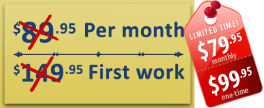Financial Priority: Pay Off Credit Cards First
TweetThe economy is slowly, but surely beginning to see improvements in many areas. However, the credit crunch is far from over. Lenders have drastically cut back on loans and have increased their scrutiny of applications ten fold. They are also raising interest rates, slashing limits on credit card accounts and HELOCs and closing accounts in record numbers in response to the increase of consumer delinquencies.
If your account has suffered any recent penalties, your credit score has likely taken a hit. With 740 as the new prime score, you need to keep your credit report as clean as possible. One way to do that is to reduce and, if possible, pay off your credit cards. Paying off your debts should be a top financial priority, even more important than savings; although savings is at a very close second. Interest rates on savings accounts are extremely low, while interest rates on credit accounts continue to rise. Until things are a little more stable, it is simply a wiser move to put any extra money toward your debts rather than savings.
One debt at a time
Line up all of your debt. Write down the name of each creditor, how much you owe them, current interest rates and when they expire, available limits and minimum payments.
- First; Cash advance or payday loans. If you have pay day or title loans, make these your absolute top priority. You may not know the actual interest, but trust that rates on these types of loans typically run between 100% - 400%; ouch! Get rid of them ASAP.
- Second; At or close to available limit. Next in line are accounts that are maxed out, or close to it. You need to get your debt-to available-limit ratio down. The idea is to get all balances below 50% of the available limit; even though 10% is ideal, we can't tackle everything at once.
- Third; Highest interest. When all balances are below 50% then attend to the highest interest accounts. As you pay off one account, take a moment to celebrate, and then roll that payment over onto the next-highest interest account. And so onů.
Dedicate as much money as you can toward your debt
Any money you are putting into savings or non-retirement investments (note: you should always pay your retirement fund) should be re-routed to pay down debt. There is always a way to come up with more money; stick to a budget, cut back, do extra work, sell stuff, change your tax withholdings to pay less throughout the year, etc, etc.
When all else fails
The sad reality is that many consumers can't even keep up with minimum payments, let alone paying off debts altogether. When you have done everything in your power to resolve your debt issues but don't seem to be making any progress, or continue to spiral downward, it may be time to seek help.
Be very careful who you turn to as, sadly, there are many predators out there just waiting to pounce on vulnerable prey. Do your research, compare notes and, if possible, get referrals from people you trust before you turn your finances over to anyone.
Get Out of Debt with Debt Settlement
Debt Settlement is the quickest way out of debt next to bankruptcy. With Debt Settlement, a lump sum payoff is negotiated with your creditor. The amount creditors agree to will vary, but debtors can typically expect a settlement of 25% to 45% on an unsecured account balance.
Now may be the time to consider Settlement as your debt management solution. We can help you get out from under your debt faster than any other method.



